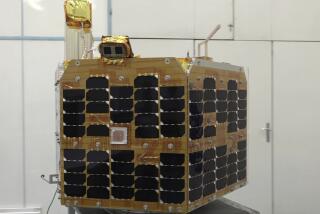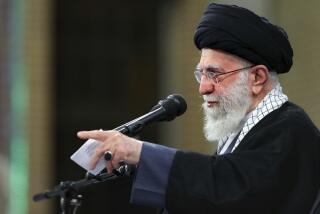Iran Ends Exercises, Vows ‘Revenge on America’
DUBAI, United Arab Emirates — Iranian forces completed naval exercises in the Persian Gulf on Friday, vowing vengeance against the United States, and Revolutionary Guard units were reported to have test-fired an anti-ship missile into the gulf.
In Tehran, meanwhile, there were emotional scenes as another 50 bodies were returned from Mecca, Saudi Arabia, where hundreds of people were killed last week in riots during the annual pilgrimage to Islamic shrines.
Tehran radio said the bodies were carried through the streets to Tehran University, where prayer services were conducted, as the crowds chanted “Death to America” and “Death to the fascist Saudi police.”
‘Revenge on America’
Iranian Interior Minister Ali Akbar Mohtashemi was quoted as saying that the responsibility for the violence in Mecca “is entirely America’s, and we will take revenge directly on America.”
The Iranians maintain that 600 Iranian pilgrims were shot and killed by Saudi police in the violence in Mecca. According to the Saudi version, no shots were fired, but 402 people--including 275 Iranians--were killed when Iranian demonstrators attacked Saudi security forces and started a stampede among the million or more pilgrims in the holy city. Egyptian pilgrims returning to Cairo on Friday supported the Saudi version of events.
The Iranian naval exercises code-named “Martyrdom,” which began Tuesday, were reported to have ended with a review of warships by President Ali Khamenei. Tehran radio said hundreds of patrol boats passed by with their crews shouting anti-American slogans.
It said air units of the Revolutionary Guards passed overhead. This was the first indication that the Guards have acquired aircraft. Previously only Iran’s air force was known to have combat planes.
Revolutionary Guards units were reported to have carried out landings on islands in the gulf and to have blown up a “naval target” with explosives. The broadcasts gave no details of these operations.
The official Islamic Republic News Agency said on Thursday that Khamenei ordered the test-firing of a “shore-to-sea missile,” an apparent reference to the Chinese-made Silkworm missile the Iranians began acquiring about a year ago.
The presence of the Silkworms--another was test-fired earlier this year--has been described by Reagan Administration officials as a threat to shipping in the Strait of Hormuz, the channel between the gulf and the Indian Ocean.
Western analysts suggested that the exercises were designed as much to impress people abroad as to provide training for the Iranian military, and they have created new tension in the gulf in the wake of the Mecca violence. The exercises were to have ended Thursday but were extended for a day.
Meanwhile, a group of U.S. warships has gathered near the mouth of the strait in preparation for a second convoy of Kuwaiti tankers re-registered under the American flag.
Three tankers will be escorted to Kuwait in the next convoy. Two of the 11 “reflagged” tankers were escorted in July and the Reagan Administration has agreed to reflag six other Kuwaiti ships.
At the Pentagon, spokesmen refused Friday to say when the second convoy of re-flagged Kuwaiti tankers would be escorted through the Strait of Hormuz, but indications were that the convoy would remain outside the gulf until next week.
Sources said U.S. Navy minesweeping helicopters should reach the gulf this weekend or early next week aboard the helicopter carrier Guadalcanal. Eight helicopters were dispatched from the United States after the tanker Bridgeton was damaged when it hit a mine in the gulf on July 24. After reaching the Indian Ocean island of Diego Garcia aboard huge C-5 transport planes, the copters were ferried this week to the Guadalcanal, which was reported to be en route to the gulf on Friday.
The Washington Post reported Friday that the U.S. Joint Chiefs of Staff decided earlier this week to delay further escorting of Kuwaiti tankers until the helicopters are in position to neutralize mines believed planted by Iran.
“We don’t discuss ship movements,” one Pentagon spokesman said when asked about the report. But other sources quoted by Reuters news agency said “we have decided to wait until the copters aboard the Guadalcanal can start doing their work” before renewing the escort operation.
In Italy, the government suggested that the U.N. Security Council consider creating a multinational minesweeping force for the gulf.
Times Staff Writers Don A. Schanche, in Rome, and Gaylord Shaw, in Washington, also contributed to this article.
More to Read
Sign up for Essential California
The most important California stories and recommendations in your inbox every morning.
You may occasionally receive promotional content from the Los Angeles Times.










